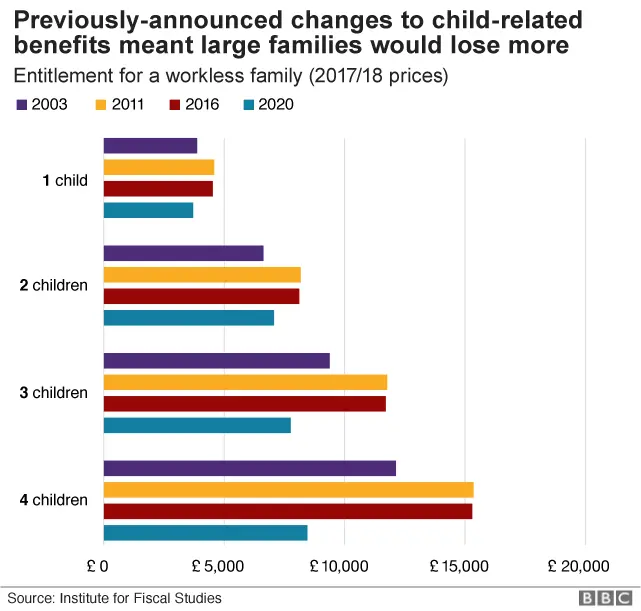Universal credit: U-turn on two-child cap on benefit
 AFP/Getty Images
AFP/Getty ImagesAbout 15,000 families no longer face having their benefits capped after the government performed another U-turn over its flagship universal credit.
The work and pensions secretary has ditched plans to extend a benefits cap on families of more than two children.
Amber Rudd said those with children born before the system began in 2017 would remain exempt, as she aimed to ensure it was "compassionate and fair".
The Child Poverty Action Group said the decision was "fantastically good news".
However, the group is still calling for the two-child cap to be scrapped for all other families.
Labour said the change "does not go far enough".
Will the changes help you? Email [email protected]
Ms Rudd also confirmed she would again delay asking MPs to authorise the transfer of three million people from the old benefits system.
Instead, the government will run a pilot involving 10,000 people going through the universal credit process.
BBC political correspondent Ross Hawkins said Ms Rudd also remains under pressure to shorten a five-week wait before new universal credit claims are paid.
He added that Ms Rudd may ask the Treasury for more money to implement further modifications, once the pilot scheme is completed.

Ms Rudd told BBC Radio 4's Today programme: "I'm making a number of changes to our welfare system to make sure that it delivers on the intent which is to be a safety net and also to be a compassionate and fair system helping people into work."
Ahead of a speech on Friday announcing the changes, she also signalled a benefit freeze introduced in 2016 might not be renewed when it comes to an end next year.
"It was the right policy at the time... I look forward to it coming off," she told Sky News.

What is universal credit?
Universal credit is a benefit for working-age people, replacing six benefits and merging them into one payment:
- income support
- income-based jobseeker's allowance
- income-related employment and support allowance
- housing benefit
- child tax credit
- working tax credit
It was designed to make claiming benefits simpler, and is being introduced in stages across the UK.

Confirming she would delay asking MPs to authorise the transfer of three million people from the old benefits system, she told Today: "We have listened to people. We know they want more individual assistance either with getting payments more regularly or having payments made direct to landlords."
"These elements, which could help universal credit work more helpfully for individuals receiving it, are what I'm going to be changing."
She also said she wanted to ensure that the main carer in a household would be the primary recipient of universal credit.
On the two-child limit, she will say in her speech later that it was "not right" for it to apply to those who had their children before the cap was announced.
"These parents made decisions about the size of the family when the previous system was the only system in place," she will say.
The "child element" of universal credit varies, but is worth at least £231.67 a child per month.
Ms Rudd, who became work and pensions secretary in November, accepted there were problems with universal credit, and promised to "learn from errors" and "adjust" the system after taking expert guidance.
Her predecessor Esther McVey had already announced changes to ensure claimants were given more time to switch to the benefit and would not have to wait so long for their money.
The system had been the target of complaints that it was forcing some claimants into destitution and even prostitution.
Ms Rudd will defend the introduction of the benefit by saying: "Universal credit is working for the vast majority of people.
"As a nation, I believe we all want a decent safety net: if you're facing a difficult moment in life, the state should be there to help you.
"But it is vital that people are supported by this safety net, not trapped beneath it."
Shadow work and pensions secretary Margaret Greenwood said the government should abandon the two-child limit in its entirety.
"Universal credit is clearly failing and the government should stop the roll out now," she said.
Former Labour MP Frank Field, who chairs the work and pensions committee, said: "I strongly welcome the secretary of state's decision not to press ahead with what could have been the cruellest benefit cut in history.
"At the eleventh hour, she has prevented thousands of children from being plunged into poverty by an unjustifiable retrospective policy."

Analysis
By Michael Buchanan, BBC social affairs correspondent
This speech is billed as a reset of universal credit, a clear acknowledgment from Amber Rudd that further tinkering with the troubled reform will no longer do.
The last two budgets have seen billions spent trying to reduce the problems that have become ever-more obvious, from increasing use of food banks to private landlords refusing to take people on universal credit.
But this speech demonstrates that Amber Rudd believes a more fundamental assessment of the benefit is needed. That makes her the first work and pensions secretary since Iain Duncan Smith to try to take responsibility for welfare reform rather than simply managing the existing system.
She will need to convince the Treasury in particular to back her judgement.
